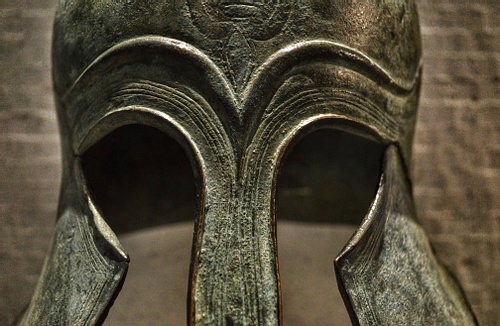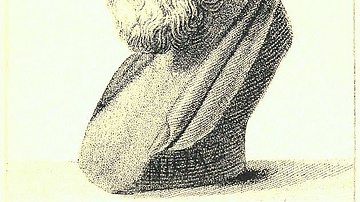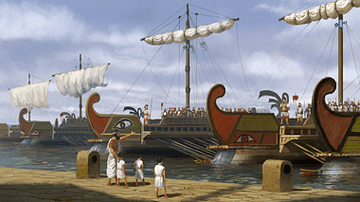![Greek Hoplites [Artist's Impression] (by The Creative Assembly, Copyright) Greek Hoplites [Artist's Impression] (by The Creative Assembly, Copyright)](https://www.worldhistory.org/img/r/p/500x600/4820.png?v=1741821138)
Brasidas (d. 422 BCE) was an enterprising and successful Spartan general during the early years of the second Peloponnesian War (431-404 BCE) between Athens and Sparta. His successes against the Athenians tilted the balance of the war back towards the Spartans after their disaster at Pylos (425 BCE). Brasidas encouraged a number of revolts against Athens and detached a number of cities, including the important city of Amphipolis, from the Athenian Empire. At the Battle of Amphipolis in 422 BCE he defeated an Athenian army led by Cleon; however, both generals died in the fighting. He was also responsible for Thucydides' change of career from general to historian.
The Early Peloponnesian War
Nothing is known of the early life of Brasidas, son of Tellis. He first drew attention in Thucydides' account of the Peloponnesian War for his successful relief of the town of Methone against an Athenian assault in 431 BCE. An Athenian fleet of 100 ships, supported by 50 more from Corcyra (Corfu), was sailing around the Peloponnese to ravage the territory of Sparta and its allies. Arriving at Methone, they realised that it was not garrisoned and had a weak wall. As they were preparing to attack, Brasidas, who was in charge of a small force defending the district, managed to break through the Athenian army with only 100 hoplites. The Athenians could not afford a prolonged siege so this decisive action was enough to save Methone. According to Thucydides, Brasidas ''won the thanks of Sparta by his exploit, being thus the first officer who obtained this notice during the war'' (The Peloponnesian War, 2.25). According to Xenophon (Hellenica II.3.10), Brasidas was in the same year elected as one of Sparta's five annual magistrates (the ephors), perhaps in recognition of his action at Methone.
By 429 BCE, the Spartan fleet had been bested in a succession of engagements by the Athenians. According to Thucydides, the Spartans were so lacking in naval knowledge that they could not understand that it was their lack of experience that was the problem. Consequently, they blamed their defeats on ''misconduct somewhere'' (The Peloponnesian War, 2.85) and sent Brasidas, along with two other commissioners, to advise the Spartan admiral. After a reorganization of the fleet, the Peloponnesians won a small naval engagement at Naupactus. The victory was short-lived, however, as a single fleeing Athenian ship suddenly turned around and sunk its pursuer, causing a number of the Peloponnesian ships to run aground in panic. The rest of the Athenian fleet then sailed out to pursue the Peloponnesians, capturing six of their vessels and recapturing most of the ships they had lost in the earlier engagement.
We next hear of Brasidas in 427 BCE, when he was sent out to advise the Spartan admiral Alcidas. A civil war had broken out in Corcyra, and the Spartans took 50 ships to aid the pro-Peloponnesian oligarchic party against the pro-Athenian popular party. The oligarchs were defeated before their arrival and the Corcyraean fleet of 60 ships, supported by twelve Athenian ships, attacked the Peloponnesians. Thanks to Corcyraean infighting and disorganization, the Peloponnesians won a small victory; however, they then returned to the Peloponnese upon the approach of Athenian reinforcements, leaving the oligarchic party in Corcyra to be massacred by their opponents.
Brasidas gained further recognition for an audacious assault on the Athenian positions at Pylos in 425 BCE. As the Spartans attacked the Athenian positions by ship, some of the commanders were wary of running aground. According to Thucydides, Brasidas encouraged the attackers to sacrifice their ships. He forced his own ship ashore and was ''endeavoring to land when he was beaten back by the Athenians and after receiving many wounds fainted away'' (The Peloponnesian War, 4.12).
In 424 BCE, the Athenians hatched a plot to conquer Megara using sympathizers inside the walls. Megara is located on a crucial strategic position on the isthmus between Athens and the Peloponnese. During the First Peloponnesian War (460-445 BCE), Megara had initially sided with Athens and control of Megara had prevented Peloponnesian armies from ravaging Attica or aiding their Theban allies. If Megara again fell into Athenian hands, it would have been a significant strategic victory for Athens. Fortunately for Sparta, Brasidas happened to be in the vicinity raising an army for a planned campaign in northern Greece. Showing none of the hesitation for which Spartans were famous, Brasidas sent a request for reinforcements to Thebes and supplemented his own forces with men from local poleis.
The Theban reinforcements managed to surprise and defeat the Athenian light-armed troops around Megara, but a cavalry skirmish between the Thebans and Athenians ended in a stalemate. Brasidas drew up his army, which now numbered 6,000 hoplites and 600 cavalry, for battle on the plain. The Athenians, numbering only 4,600 hoplites, as well as light-armed troops and cavalry, decided against battle and withdrew. The Megarians, who had been waiting to see who would win the battle before declaring for either side, now opened their gates to Brasidas and executed those who were suspected of working with the Athenians.
Campaigns in Northern Greece
Later in 424 BCE, Brasidas marched his new army to northern Greece. The region was an important source of Athenian raw materials, as well as a key stopping point for Athenian trade to the east. It was hoped that Athenian attacks on the Peloponnese could be diverted by attacking valuable Athenian possessions. Perdiccas, the king of Macedon, was wary of Athenian expansionism in the region, and a number of Chalcidian cities requested support so that they could defect from the Athenian Empire. Even with such promises of local support, the Spartan state was unwilling to risk the lives of Spartan citizens on such a long-range and high-risk campaign, so his army of 1,700 hoplites consisted of 1,000 mercenaries and 700 helots who had been promised their freedom.
In Thucydides' account, Brasidas was not only a highly competent general, but he was also a successful orator. In a speech to the people of Acanthus, who were debating whether or not to join the Spartans, Brasidas persuasively argued that the only Spartan goal was the freedom of Greece and that the Spartans would respect the freedom of Acanthus. For anybody unconvinced by his eloquent rhetoric, he added that refusal to join him would result in the destruction of their vines and crops (Thucydides, The Peloponnesian War, 4.85-4.87).
In the winter following (424-423 BCE), Brasidas besieged Amphipolis. Hearing that an Athenian force led by Thucydides was on its way, Brasidas offered the inhabitants particularly good terms, which they accepted before the Athenian relief force arrived. Thucydides did manage to arrive at Eion before Brasidas, which he reinforced and defended from an attack. At this point, Brasidas requested reinforcements from Sparta, but his request was denied because the Spartans were hoping to arrange a truce in which they could recover the Spartan prisoners captured on Pylos. Even so, Brasidas managed to capture Torone in a surprise attack before a one-year armistice was agreed between Athens and Sparta in the following spring. During this truce of 423 BCE, Scione and Mende revolted from Athens and Brasidas supported them, breaking the terms of the agreement. He then joined Perdiccas in a campaign against the Lyncestians, during which the Macedonians abandoned the Spartans, leading to the dissolution of their alliance. Perdiccas then allied with the Athenians, making it difficult for any future Spartan reinforcements to reach Brasidas by land.
In 422 BCE, the Athenian demagogue Cleon was sent to defeat Brasidas. He initially enjoyed some success, managing to retake Torone before Brasidas could send support. Cleon and Brasidas met in battle at Amphipolis. Cleon had advanced from Eion to view Amphipolis with only a part of his force, not expecting Brasidas to come out to meet him. As Cleon was returning to Eion, Brasidas' forces emerged from Amphipolis and caught the Athenians in a state of disorder. The Athenian left fled immediately, but Brasidas was wounded in the pursuit and died shortly after he had heard of his victory. Cleon was killed as he fled, although the right flank which he commanded stood their ground until they were overcome by the missiles of Brasidas' peltasts and cavalry.
According to Thucydides, the people of Amphipolis built a tomb for Brasidas next to the agora, called him the founder of their city and ''ever afterwards sacrifice to him as a hero and have given to him the honor of games and annual offerings'' (The Peloponnesian War, 5.11).
Repercussions of His Campaigns
According to Thucydides, his 'just and moderate conduct' persuaded many cities to revolt; and his example later convinced other cities to request Spartan generals: he ''showed himself so good a man at all points as to leave behind him the conviction that the rest were like him'' (The Peloponnesian War, 4.81). His campaigns in northern Greece resulted in a permanent reduction in Athenian influence in the region, and the loss of Amphipolis was taken particularly hard by the Athenians. Athens laid claim to Amphipolis for decades afterwards, and its eventual absorption into the Macedonian Kingdom in 357 BCE was a critical factor in Athenian animosity towards Philip II of Macedon. In the short term, Brasidas' victories counterbalanced Athenian successes against Sparta in other theatres. This helped Nicias to convince the Athenian assembly that peace with Sparta would be in their best interests. In addition, Brasidas and Cleon were ''the two principal opponents of peace on either side'' (Thucydides, The Peloponnesian War, 5.16), so their deaths helped make possible the Peace of Nicias in 421 BCE.
Legacy
Despite the importance of Brasidas' military exploits, perhaps his most important legacy was the damage he did to the military reputation of the historian Thucydides. Thucydides was blamed when the relief force he led was too late to save Amphipolis. This failure destroyed Thucydides' public career and led to his exile from Athens - giving him plenty of time to write his unsurpassed history of the Peloponnesian War. If Thucydides was bitter about Brasidas' destruction of his career, his depiction of Brasidas in his history as a charismatic, energetic and inspiring figure did not show it. The glowing reputation of Brasidas was also used by Plutarch to demonstrate the stoical toughness of Spartan women. According to Plutarch, when messengers visited Brasidas' mother to tell her about the heroic death of her son, she informed them that ''Brasidas was a brave man, but Sparta has many better men than he'' (Life of Lycurgus, 25).










